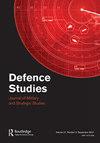The Philippines-U.S. Alliance and 21st Century U.S. Grand strategy in the Indo-Pacific region: from the Obama Administration to the Biden Administration
Q1 Arts and Humanities
引用次数: 0
Abstract
ABSTRACT This article situates the Philippines-U.S. alliance within the changing U.S. grand strategies from Barrack Obama’s rebalancing to Asia to President Joe Biden’s continuance of the Trump Administration’s strategic competition with China. Upon President Obama’s announcement of the rebalancing policy in 2011, the Philippines already figured prominently in the American security agenda in Asia, particularly with the intensification of the Philippines-China territorial dispute in the South China Sea. In 2016, President Rodrigo Duterte effected a major shift in Philippine foreign policy by distancing the country from the U.S. and gravitating toward China. The Trump Administration, however, saw the Philippines as a crucial ally in its geostrategic competition with China. Consequently, Washington adopted a policy of strategic patience to bring Duterte onside the U.S. rather than pushing him to China’s embrace. This scheme stabilized the two countries’ security relations and ensured the Philippines’ commitment to the U.S. system of bilateral alliances. In conclusion, the article argues that given the Philippines’ close security ties with the U.S. that often clash with China’s strategic interests and close Philippines-China diplomatic/economic relations, it will be difficult and challenging for President Duterte to pursue an independent foreign policy.菲律宾-美国联盟与21世纪美国在印太地区的大战略——从奥巴马政府到拜登政府
本文以菲律宾-美国关系为背景。从巴拉克·奥巴马的亚洲再平衡到乔·拜登总统继续与中国进行战略竞争的美国大战略变化中的联盟。2011年奥巴马总统宣布再平衡政策时,菲律宾已经在美国的亚洲安全议程中占据了重要地位,尤其是在菲律宾和中国在南中国海的领土争端加剧之际。2016年,总统罗德里戈·杜特尔特(Rodrigo Duterte)使菲律宾外交政策发生重大转变,疏远美国,向中国靠拢。然而,特朗普政府将菲律宾视为与中国地缘战略竞争的关键盟友。因此,华盛顿采取了战略耐心政策,把杜特尔特拉到美国一边,而不是把他推向中国的怀抱。这一计划稳定了两国的安全关系,并确保了菲律宾对美国双边联盟体系的承诺。综上所述,本文认为,鉴于菲律宾与美国的密切安全关系经常与中国的战略利益发生冲突,以及菲中密切的外交/经济关系,杜特尔特总统追求独立的外交政策将是困难和具有挑战性的。
本文章由计算机程序翻译,如有差异,请以英文原文为准。
求助全文
约1分钟内获得全文
求助全文

 求助内容:
求助内容: 应助结果提醒方式:
应助结果提醒方式:


